National Kindergarten Day 2025: no phone or tablet
Read what impact smartphones and tablets are having on the development of preschoolers.


Learn more about our editorial process
.

Learn more about our editorial process
.

Learn more about our editorial process
.

Learn more about our editorial process
.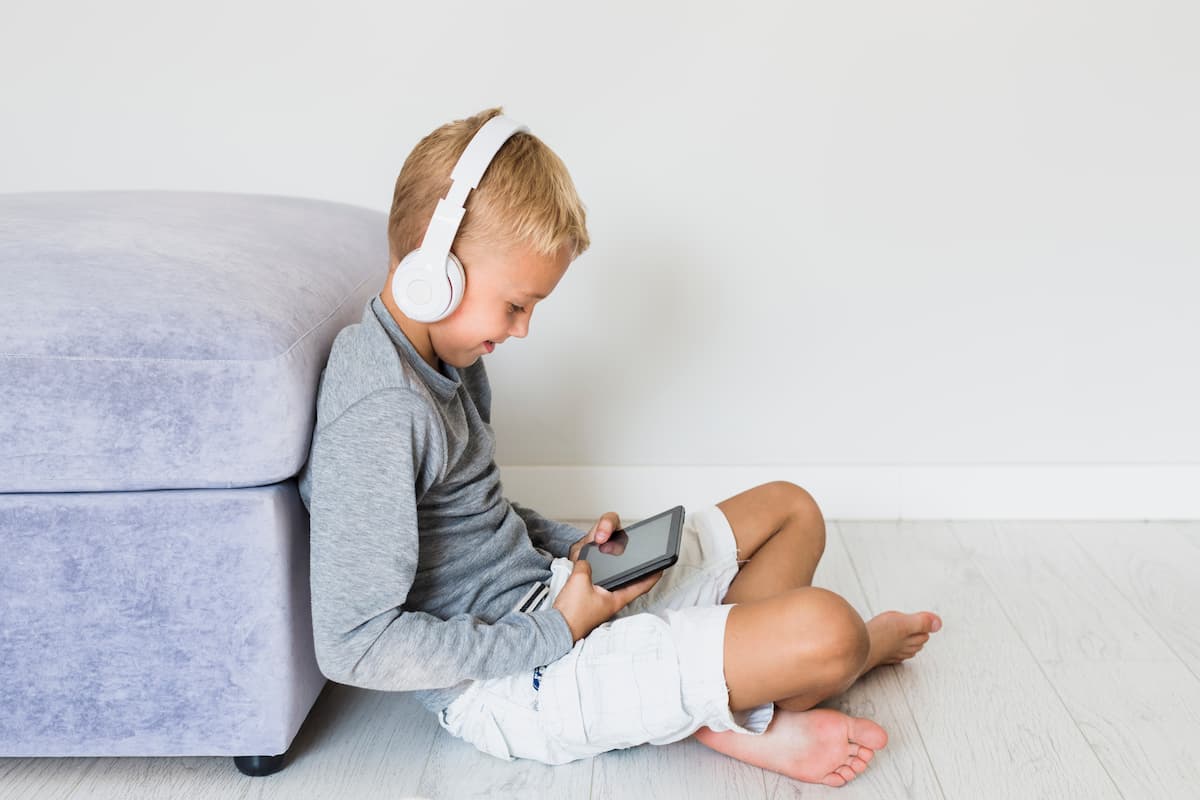
Why you can trust us
Articles on Natu.Care are written based on scientific research, data from government websites and other reliable sources. The texts are written in cooperation with doctors, nutritionists and other health and beauty experts. Articles are reviewed before publication and during significant updates.
.Learn more about our editorial process
.Information about advertisements
Content on Natu.Care may contain links to products from the sale of which we may receive a commission. When creating content, we adhere to high editorial standards and take care to be objective about the products discussed. The presence of affiliate links is not dictated by our partners, and we select the products we review ourselves completely independently.
.Learn more about our terms and Conditions
.A small glass screen that responds to touch. A seemingly ordinary glass screen, but it has a mesmerising effect on everyone. Especially children.
Children are capable of being lost for a few hours with their nose in the phone. Worse if they also forfeit their childhood and, according to the researchers, their ability to develop properly.
They are also able to forfeit their childhood and, according to the researchers, their ability to develop properly.
From this article you will learn:
- How phones and tablets affect pre-school children.
- How much time several year olds can spend with mobile devices.
- How mobile devices can affect children.
- What excessive smartphone and tablet use can result in.
- What are the rules of the game?
- What are the rules for safe use of mobile devices and how to keep them secure. .
See also:
- Tobacco Cessation Day .
- World No Mobile Phone Day
- Clean Air Day
- Lung health after a pandemic
- Great Bee Day
- Blood Donor Day
- Fish Day
- Hug Day
- Bone Marrow Donor Day
- Tobacco Cessation Day
What the science says
.According to research conducted by the Nobody's Children Foundation, as many as 40% of two-year-olds and younger (sic!) children in Poland use a smartphone or tabletand. In contrast, in a recent report commissioned by the Office of Electronic Communications for 2022, almost 10% of parents admitted to giving their child their own mobile phone before the age of six . In the 2021 NASK report, this was declared by 5.2% of parents .
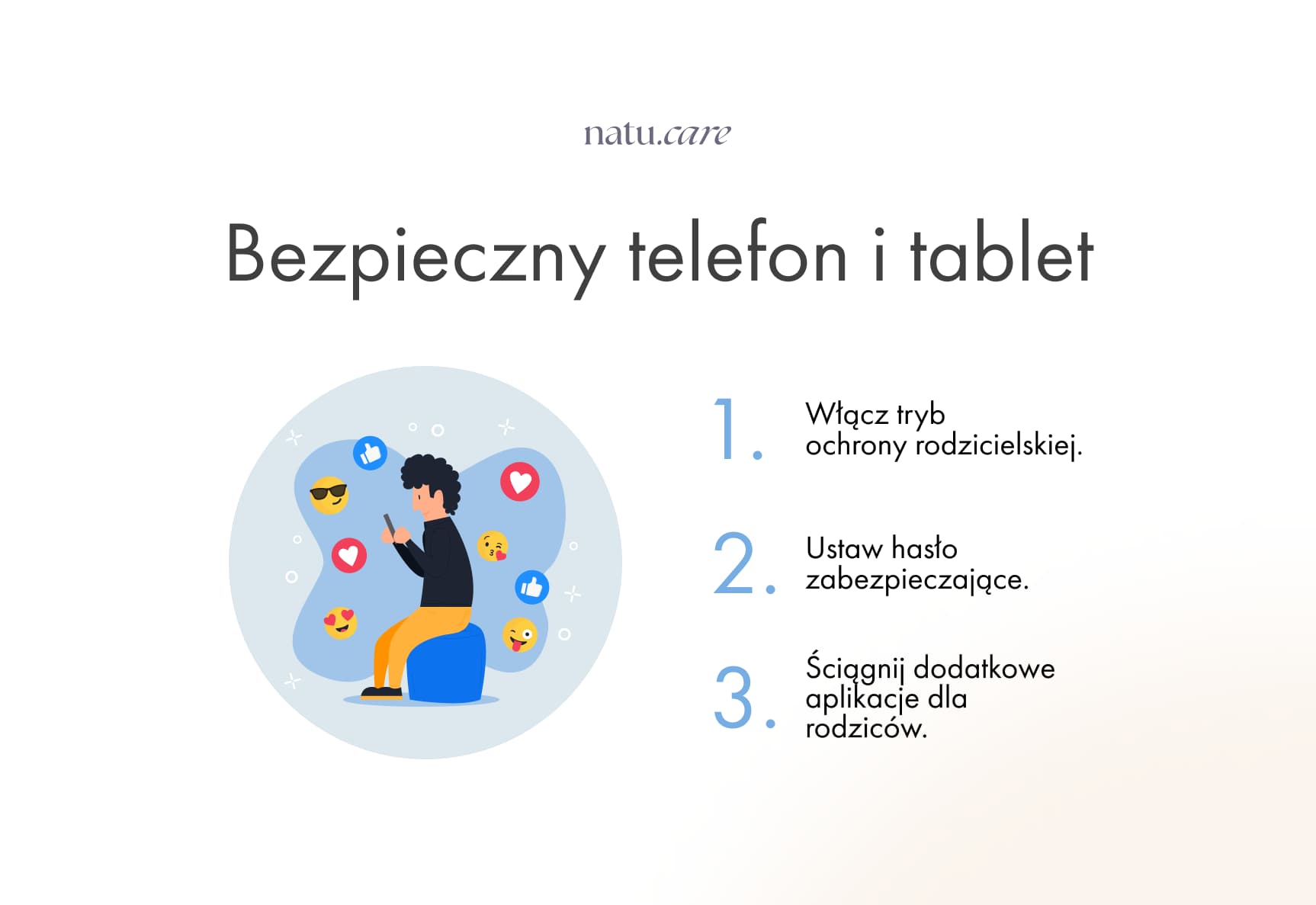
Does this mean that we are more and more willing to give away our phones to children every year? As the surveys were carried out by other parties, may have differed in the selection and size of the representative sample, as well as in the methodology, no firm conclusions can be drawn. However, the trend may be of concern.
Although it may seem that a tablet or phone is a toy like any other, some scientists are of a different opinion. During the first few years of life, the human body develops most intensively - this includes the brain and the senses (such as the sense of balance)and.
At the end of the second and the beginning of the third year of life, a child has the most neuronal connections in his or her life. In the following years it will become apparent which of these will remain and which will atrophy. Of course, the most important connections, i.e. those most supported by the stimuli coming from the environmentand.
will become established.If a child's world is confined to a small glass screen, neuronal pathways dedicated to the stimuli coming from the screen will become fixed in their brain. An extension of this logic may be the conclusion that those responsible for agility, agility, creativity, social skills may disappear...
.
Doesn't sound very good, does it?
.In order for the preschooler's brain to develop properly, it needs stimuli and information touching all its senses. Kicking a ball, stacking blocks, touching the grass or a tree trunk, but also interacting with family members and peers shape the central nervous system, allowing the child to reach his or her full potentialand.
>Dangers, or a word about addiction
.Children learn much faster than adults and... fall into addiction much faster. This is why it is so important to establish and consistently adhere to rules for tablet and phone use from an early age.
Important
Experts say that children up to the age of two should not use mobile devices, the computer or television at all. For slightly older preschoolers, this time should be heavily restricted and play should be under parental supervisionand.
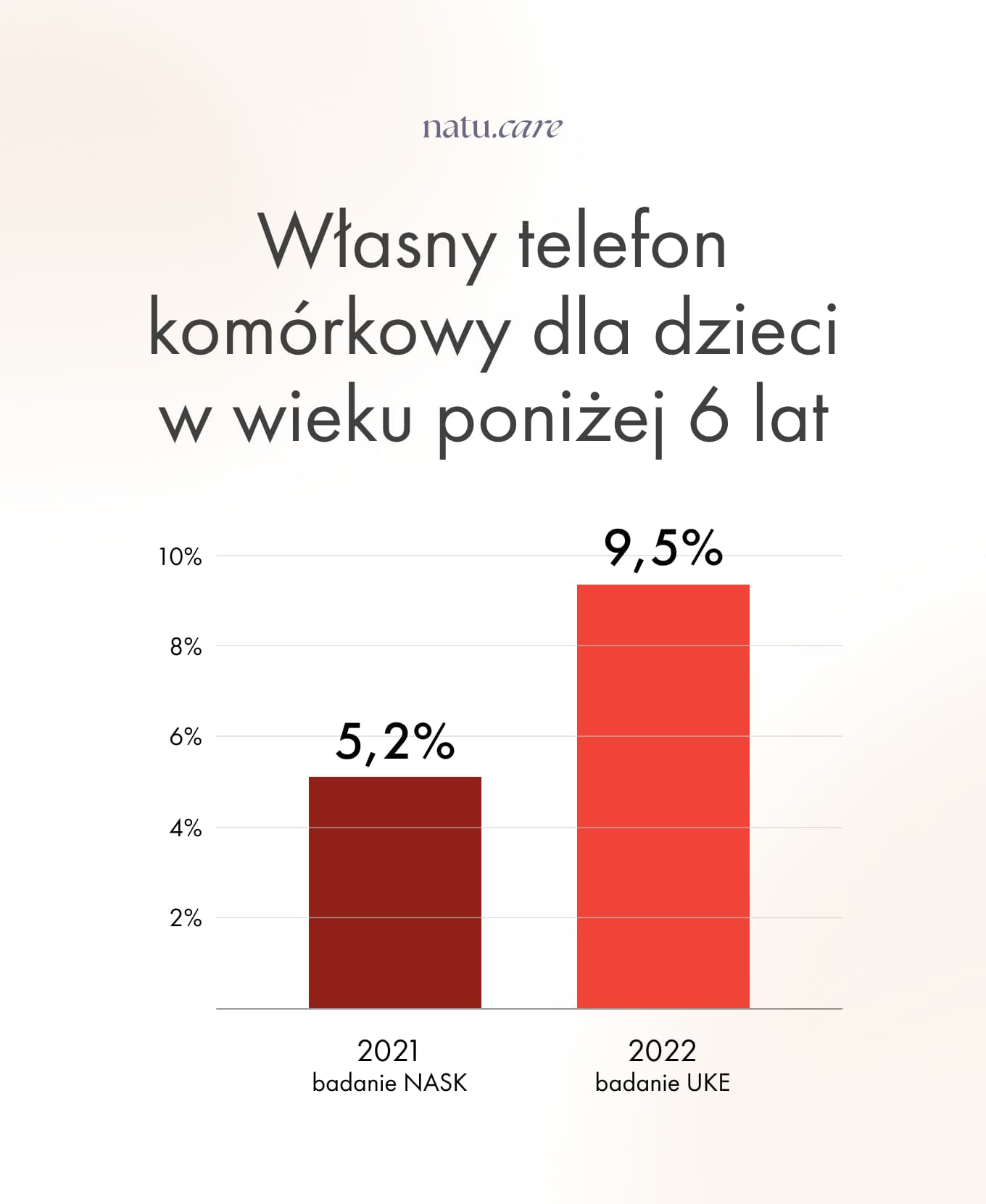
Using tablets and smartphones for too long and too often can result in concentration disorders. There is constantly something going on on the small screen, and most of the time you don't need to focus on it at all. So it's not surprising that when a task needs to be completed that requires concentration, the child struggles to do soand.
Prolonged exposure to blue light, which is emitted by mobile device screens, disrupts sleep and compromises sleep quality. What's more, some children also reach for their phone at night - "because their parents can't see" or out of fear of missing something on social media. Without a healthy dose of sleep, the body doesn't have a chance to fully recover, which can have further health consequencesand.
Spending time on the phone doesn't leave much of it for socialising either. This may sound funny in the context of pre-school children, but this is when social skills are built. Children need socialisation, i.e. other children and people. Definitely not just the ones smiling on TikTok.
.This virtual alienation can, in the long term, lead to deterioration of quality of life the child and even the onset of depressive symptoms.
When addicted, levels of aggression also increase - especially when trying to restrict a child's stimulant. Children of several years of age do not control their emotions, so parents may have to deal with their tantrums or hysterical attacks.
But the psychological and behavioural consequences of children abusing smartphones and tablets are not all. Researchers also point to an increased risk of obesity, which is associated with reduced physical activity.
The risk of obesity is also increased.
Another problem is eating problems. Snacking while watching a cartoon or playing a game goes virtually unnoticed. This is probably why as many as 25% of parents, use their phone and tablet when giving their children foodand.
Spending a lot of time in front of TV, tablets and smartphones also influences children's delayed speech development, reduced vocabulary and lower intellectual performance..
 .
.
Jagoda TurowskaPsychologist and social skills trainer
It is increasingly common to find children who have spent the first 2 years of their lives in front of the television. And unfortunately, in some of these situations, it turns out that electronics have disrupted the child's development to such an extent that their functioning can easily be mistaken for autism, adds psychologist.
Did you know that...
.A 2019 study found that preschoolers using smartphones for more than two hours a day had a higher risk of ADHDand.
Natu.Care Collagen Premium 5000 mg, mango & passion fruit

- Collagen content: 5000 mg marine collagen hydrolysate
- Additional active ingredients: vitamin C, low molecular weight hyaluronic acid (and L-theanine and coenzyme Q10 in cocoa flavoured collagen or vitamin A and vitamin E in mango–passion fruit flavoured collagen)
- Form: powder sachets
- Dose: 1 sachet per day
- Sufficient for: 30 days
Product description
Fish collagen from the Natu.Care brand in a dose of 5000 mg, based on certified ingredients of the best quality. Regular supplementation will positively influence the appearance of the skinóry, hairów and nails – they will be rebuilt and strengthened from the inside.
In addition to collagen, which is valuable for health and beauty, it also offers other active ingredients that help to maintain a youthful complexion, shiny hair and strong nails.
The formula contains a sufficient portion of the active ingredient to positively affect joints, the musculoskeletal system and immunity.
Natu.Care Premium Collagen is available in two flavours – Cacao Bloom and Rise&Shine. Both formulas are based on the following active ingredients: marine collagen hydrolysate, wild roseóbud extract and hyaluronic acid.
Additionally, Cacao Bloom contains natural L-theanine, coenzyme Q10 and defatted Dutch cacao. Rise&Shine instead contains vitamin E and vitamin A.
These are the best collagens in the world.
These best fish collagens on the market also rós taste – Cacao Bloom is a treat for chocolate lovers. Rise&Shine will appeal to those whoólike the refreshing taste of mangoófruit and passion fruit.
Pros and cons
Pros:
- Vitamin C supports the body's collagen production, enhancing its effectiveness.
- An effective dose of hyaluronic acid, which additionally supports skin hydration and joint health.
- Fish collagen absorbs 50% better. Additionally, the manufacturer specifies the fish species it is sourced from (Atlantic cod).
- The composition has been tested by the independent and accredited J.S. Hamilton laboratory.
- MSC (Marine Stewardship Council) quality certification, which confirms that the collagen source supports sustainable fishing practices.
Cons:
- None.
Additional information
Natu.Care's fish collagen receives praise for its delicious taste. You won't find the fishy aftertaste that often comes through in other collagens. Plus, you have two tasty flavors to choose from: cocoa and mango-passionfruit.
Active ingredients like coenzyme Q10, hyaluronic acid, and natural L-theanine provide anti-inflammatory and antioxidant benefits while slowing down aging processes.
User review
Super, after about 6 weeks of use, the skin on my face became noticeably firmer. Wonderful taste.
Ania ZalewskaNatu.Care customer
Natu.Care Premium collagen 10 000 mg, mango-maracuja

- Collagen content: 10,000 mg marine collagen hydrolysate
- Additional active ingredients: vitamin C, low molecular weight hyaluronic acid (and L-theanine and coenzyme Q10 in cocoa flavoured collagen or vitamin A and vitamin E in mango–passion fruit flavoured collagen)
- Form: powder sachets
- Dose: 1 sachet per day
- Sufficient for: 30 days
Product description
One of the strongest collagens on the market, whichós provides as much as 10,000 mg in a daily serving. This allows the formula to effectively support the condition of the skin, hair and nails.
With this supplement, you will support your beauty, which will allow you to visually stop the ageing process and feel a second youth!
Natu.Care Collagen Premium 10 000 mg comes in two flavours – cherry and mango-maracuja. Both formulas have the same product backbone – collagen, hyaluronic acid and vitamin C.
In the cherry version you additionally find glucosamine, chondroitin and Indian frankincense resin extract. Mango-maracuja, on the other hand, contains vitamin E and vitamin A.
Pros and cons
Pros:
- Tested collagen formula – SeaGarden, whose effects have been confirmed in clinical studies.
- Effective dose of hyaluronic acid, additionally moisturizing the skin and positively impacting joint health.
- Vitamin C supports the body’s natural collagen production.
- The composition has been tested by the independent and accredited J.S. Hamilton laboratory.
- The product has an MSC (Marine Stewardship Council) quality certification – the collagen source supports sustainable fishing practices.
Cons:
- None.
Additional information
Users praise Natu.Care Collagen Premium for the easy dissolvability of the powder.
User review
I noticed a significant improvement in my skin texture after a few weeks of taking collagen regularly. My complexion is now as soft as velvet!
Natu.Care Collagen Premium 10000 mg, cherry

- Collagen content: 10,000 mg of hydrolyzed bovine collagen
- Additional active ingredients: vitamin C, low molecular weight hyaluronic acid, glucosamine, chondroitin, extract of Indian frankincense resin (boswellia serrata)
- Form: powder sachets for drinking
- Serving: 1 sachet per day
- Lasts for: 30 days
Product description
One of the strongest collagens on the market, providing as much as 10,000 mg per daily serving. This product can effectively support the condition of joints, skin, hair, and nails.
With this supplement, you will support your skeletal and joint system as well as your beauty, helping you visually halt the aging process and feel rejuvenated!
Pros and cons
Pros:
- The daily portion of collagen is very large – as much as 10,000 mg.
- Proven collagen formula – COLLinstant, whose effectiveness has been confirmed in clinical studies.
- Effective dose of hyaluronic acid, which additionally moisturizes the skin and positively affects joint health.
- Vitamin C supports the body's natural collagen production.
- Glucosamine is a fundamental building block of compounds found in joint cartilage and a component of collagen that gives elasticity to connective tissue in tendons.
- Chondroitin is a natural component found in the human body, mainly in cartilage. This large molecule (mucopolysaccharide) has the ability to absorb water, which helps maintain the elasticity and resilience of cartilage.
- Frankincense resin extract supports blood circulation and joint mobility and reduces their stiffness. It may help alleviate inflammatory conditions.
- The composition has been tested by the independent and accredited J.S. Hamilton laboratory.
Cons:
- None.
Additional information
Users praise Natu.Care Collagen Premium for the easy dissolving of the powder.
Premium Sodium Butyrate
Product description
Premium Sodium Butyrate is a natural support for your digestive system. With a high dose of butyric acid (940 mg), it supports the regeneration of the intestinal mucosa, improving gut health and function, and aids in the absorption of nutrients. By taking care of your intestines, you're taking care of the health of your entire body.
Studies involving people suffering from irritable bowel syndrome confirm that sodium butyrate is ideal for supporting issues related to bacterial flora imbalances (for example, after antibiotic therapy), constipation and diarrhea, inflammation of the intestinal mucosa, or a diet low in fiber.
Premium Sodium Butyrate capsules are made using the innovative DRcaps® technology. This guarantees that the active ingredients in the product are protected from the destructive effects of stomach acids and digestive enzymes. As a result, we can be sure that the beneficial ingredients are released in the small intestine and are fully absorbed by our body.
Premium Sodium Butyrate from Natu Care is 100% tested, and its composition contains only the highest quality raw materials.
Pros and cons
Pros:
- Supports digestive system function
- Helpful for various gastrointestinal conditions, including IBS
- High dose of butyric acid in each capsule
- Eco-friendly, clean, and tested composition
- Free from added sugar, gluten, GMOs, and lactose
- Innovative capsule technology - DRcaps
Cons:
- None
Additional Information
Take 3 capsules daily at any time of the day, preferably with a meal. Swallow the capsules whole with water.
Premium Sodium Butyrate is intended for adults.
The product should be used under medical supervision.
User review
I've been using the product for 2 weeks. My stomach feels lighter, and my digestion has improved. I recommend it.
Natu.Care Premium Magnesium + Vitamin B6

- Magnesium content per day: 305 mg
- Additional active ingredients: Vitamin B6 (2.1 mg)
- Form: capsules
- Serving size: 3 capsules per day
- Sufficient for: 30 days
Product description
The Premium Magnesium + Vitamin B6 dietary supplement is a comprehensive product that combines three organic forms of magnesium (citrate, malate, and diglycinate) and vitamin B6 in highly absorbable forms.
Magnesium is an essential mineral without which our bodies cannot function properly. It supports the immune, nervous, and muscular systems, maintains electrolyte balance, and is involved in cell division and the regulation of mental functions.
Research shows that magnesium supplementation is even more effective when accompanied by vitamin B6, which is included in our product. Vitamin B6 is responsible for the proper functioning of the nervous and immune systems, as well as the proper functioning of the heart.
If you want to safely get rid of feelings of fatigue, concentration problems, hair loss, muscle cramps, trembling, or irritability, reach for Premium Magnesium from Natu.Care, tested by the independent, certified laboratory J.S. Hamilton Poland.
Pros and cons
Pros
- Supports the proper functioning of the nervous and immune systems.
- Reduces feelings of fatigue and tiredness.
- Maintains proper psychological functions.
- The purity of the ingredients (free from anti-caking agents, artificial fillers, and additives such as titanium dioxide, microcrystalline cellulose, talc, magnesium stearate, and silicon dioxide) has been confirmed by laboratory tests.
- High absorption of ingredients.
- Soft capsules that are easy to swallow.
- Suitable for vegetarians and vegans.
Cons
- None.
Additional information
Take with a meal, 3 capsules per day.
The capsules should be taken with at least 250 ml of water.
If you have trouble sleeping, it is advisable to take 1 capsule in the morning and 2 capsules in the evening, no later than 4 hours before bedtime.
Avoid combining with products high in calcium (milk, yogurt, cheese), as this may negatively affect magnesium absorption.
Pregnant and breastfeeding women should consult a doctor before starting supplementation.
User review
I’m very impressed with the speed of delivery. The product itself is of high quality and absorbs well. After two weeks of supplementation, I’ve noticed a significant improvement in muscle recovery, especially during periods of intense training. I highly recommend it!
Product description
The dietary supplement contains omega-3ᵀᴳ, or omega-3 acids in the form of trójglyceridesów. Scientific studies suggest that this form of fatty acidsós up to 2 times better absorbed than the estersós present in many dietary supplements on the market. This means that you are assured of their effectiveness and of supplying yourself with valuable omega acids.
Fatty acids omega-3 are derived from wild anchovy oil. It is a rich source of healthy fats that are essential for the health of the cardiovascular, immune and nervous systems, as well as the proper function of vision, joints muscles.
Scientific research suggests that wild anchovies are a good source of healthy fats.
Scientific research also suggests that an adequate intake of omega-3 fatty acidsós protects against and supports the treatment of depression and anxiety disorders. In addition, omega-3s influence the hydration and appearance of the skinóry and support healthy sleep.
.
The formula contains a total of 750 mg of EPA+DHA acidsós, which is three times higher than the recommended minimum of 250 mg for the Polish population. Omega-3 TG Premium has studies indicating that its TOTOX is 9, which is a very good result.
Supplementation of omega-3 fatty acidsóis recommended for anyone who does not eat 1–2 portions (approximately 300 g) of oily fish per week. Children during growth, seniors, physically active people, vegans and vegetarians, as well as patients undergoing cardiovascular treatment and prevention of heart disease also have an increased need.
Pros and cons
The dietary supplement contains omega-3ᵀᴳ, or omega-3 acids in the form of trójglyceridesów. Scientific studies suggest that this form of fatty acidsós up to 2 times better absorbed than the estersós present in many dietary supplements on the market. This means that you are assured of their effectiveness and of supplying yourself with valuable omega acids.
Fatty acids omega-3 are derived from wild anchovy oil. It is a rich source of healthy fats that are essential for the health of the cardiovascular, immune and nervous systems, as well as the proper function of vision, joints muscles.
Scientific research suggests that wild anchovies are a good source of healthy fats.
Scientific research also suggests that an adequate intake of omega-3 fatty acidsós protects against and supports the treatment of depression and anxiety disorders. In addition, omega-3s influence the hydration and appearance of the skinóry and support healthy sleep.
.
The formula contains a total of 750 mg of EPA+DHA acidsós, which is three times higher than the recommended minimum of 250 mg for the Polish population. Omega-3 TG Premium has studies indicating that its TOTOX is 9, which is a very good result.
Supplementation of omega-3 fatty acidsóis recommended for anyone who does not eat 1–2 portions (approximately 300 g) of oily fish per week. Children during growth, seniors, physically active people, vegans and vegetarians, as well as patients undergoing cardiovascular treatment and prevention of heart disease also have an increased need.
Additional information
The dietary supplement contains omega-3ᵀᴳ, or omega-3 acids in the form of trójglyceridesów. Scientific studies suggest that this form of fatty acidsós up to 2 times better absorbed than the estersós present in many dietary supplements on the market. This means that you are assured of their effectiveness and of supplying yourself with valuable omega acids.
Fatty acids omega-3 are derived from wild anchovy oil. It is a rich source of healthy fats that are essential for the health of the cardiovascular, immune and nervous systems, as well as the proper function of vision, joints muscles.
Scientific research suggests that wild anchovies are a good source of healthy fats.
Scientific research also suggests that an adequate intake of omega-3 fatty acidsós protects against and supports the treatment of depression and anxiety disorders. In addition, omega-3s influence the hydration and appearance of the skinóry and support healthy sleep.
.
The formula contains a total of 750 mg of EPA+DHA acidsós, which is three times higher than the recommended minimum of 250 mg for the Polish population. Omega-3 TG Premium has studies indicating that its TOTOX is 9, which is a very good result.
Supplementation of omega-3 fatty acidsóis recommended for anyone who does not eat 1–2 portions (approximately 300 g) of oily fish per week. Children during growth, seniors, physically active people, vegans and vegetarians, as well as patients undergoing cardiovascular treatment and prevention of heart disease also have an increased need.
Expert opinion
The dietary supplement contains omega-3ᵀᴳ, or omega-3 acids in the form of trójglyceridesów. Scientific studies suggest that this form of fatty acidsós up to 2 times better absorbed than the estersós present in many dietary supplements on the market. This means that you are assured of their effectiveness and of supplying yourself with valuable omega acids.
Fatty acids omega-3 are derived from wild anchovy oil. It is a rich source of healthy fats that are essential for the health of the cardiovascular, immune and nervous systems, as well as the proper function of vision, joints muscles.
Scientific research suggests that wild anchovies are a good source of healthy fats.
Scientific research also suggests that an adequate intake of omega-3 fatty acidsós protects against and supports the treatment of depression and anxiety disorders. In addition, omega-3s influence the hydration and appearance of the skinóry and support healthy sleep.
.
The formula contains a total of 750 mg of EPA+DHA acidsós, which is three times higher than the recommended minimum of 250 mg for the Polish population. Omega-3 TG Premium has studies indicating that its TOTOX is 9, which is a very good result.
Supplementation of omega-3 fatty acidsóis recommended for anyone who does not eat 1–2 portions (approximately 300 g) of oily fish per week. Children during growth, seniors, physically active people, vegans and vegetarians, as well as patients undergoing cardiovascular treatment and prevention of heart disease also have an increased need.
Natu.Care Vitamin D 2000 UI
Product description
Vitamin D plays a crucial role in our health and well-being. It affects calcium and phosphate metabolism, which translates to healthy bones and teeth. It also helps regulate the immune system, and studies indicate its influence on the functioning of the nervous system.
Vitamin D, although called a “vitamin,” is actually a prohormone that our body produces on its own, primarily under the influence of sunlight. Unfortunately, our modern lifestyle contributes to deficiencies of this essential vitamin. Working in enclosed office buildings, using (necessary!) SPF creams, and covering the body with clothing all make it very difficult, if not impossible, to obtain adequate levels of vitamin D from sunlight. This is why appropriate, year-round supplementation is so crucial.
Vitamin D from Natu.Care is a well-tested vitamin D3 suspended in safflower oil, a plant known for its numerous health benefits. The convenient, easy-to-swallow capsule will make supplementation a part of your daily, healthy routine, improving your overall well-being.
Pros and cons
Pros:
- Ensures proper functioning of the immune system
- Supports the maintenance of healthy bones and teeth
- Maintains proper heart, kidney, and muscle function
- Tested by an independent, certified laboratory
- Convenient and easy-to-swallow capsule
- Clean composition - free from added sugar, gluten, GMOs, lactose, and without preservatives or colorants
Cons:
- None.
Additional Information
Pregnant women and breastfeeding mothers should consult a doctor before using the product. This dietary supplement is intended for a healthy adult population up to the age of 75.
Collagen Booster - Glow Stories

- Active ingredients: bamboo shoot extract, Quatrefolic®, L-Methionine, L-cysteine, vitamin E, vitamin A, niacin (vitamin B3), vitamin B6, vitamin B2 (riboflavin), biotin, zinc, copper
- .
- Form: capsules
- .
- Dose: 1 capsule per day
- .
- Sufficient for: 60 days
- .
Product description
A dietary supplement containing vitamins, minerals and plant extracts thatósupport the skinóhand, hair and nails. The product is especially distinguished by the form of folate – it is Quatrefolic, whichós absorbed very well and is natural.
In addition to valuable vitamins and minerals, such as vitamin A, E, B3, B2 and biotin, the formula contains bamboo shoot extract, whichóry further enhances your beauty.
Pros and cons
A dietary supplement containing vitamins, minerals and plant extracts thatósupport the skinóhand, hair and nails. The product is especially distinguished by the form of folate – it is Quatrefolic, whichós absorbed very well and is natural.
In addition to valuable vitamins and minerals, such as vitamin A, E, B3, B2 and biotin, the formula contains bamboo shoot extract, whichóry further enhances your beauty.
Additional information
A dietary supplement containing vitamins, minerals and plant extracts thatósupport the skinóhand, hair and nails. The product is especially distinguished by the form of folate – it is Quatrefolic, whichós absorbed very well and is natural.
In addition to valuable vitamins and minerals, such as vitamin A, E, B3, B2 and biotin, the formula contains bamboo shoot extract, whichóry further enhances your beauty.
Can a preschooler safely use a smartphone?
.In light of the above, is there a safe way to introduce a young person to technology? After all, you can't get away from it anyway... The tablet and phone are not the enemy. They can be used in play, but it must be done carefully, with forethought and when the child is at least two years old.
How to make a young child familiar with technology.
How to make the time spent with smartphones and tablets worthwhile and, above all, safe? Here are some rules:
- Do not use the phone and tablet as a reward. Rewarding your child with the opportunity to use these devices will build up the child's belief that they are special and valuable.
- Provide a safe and secure environment.
- Make sure your child does not stare at a small screen for more than 15 minutes at a time. In total, a preschooler should not spend more than an hour a day in front of a smartphone - the shorter, the better.
- Be sure that your child does not spend more than an hour at a smartphone.
- Preferably, the youngest should not use mobile devices every day. A colouring book or a book can be just as entertaining.
- Help your child maintain sleep hygiene and don't give them a phone or tablet for at least two hours before bedtime.
- Match stories, games and apps to your preschooler's developmental stage. Ideally, choose content that will be of value, such as object matching games and simple logic puzzles. .
- Don't leave your preschooler with a smartphone alone. Especially if the device has internet access. It will be easier for you to control what your child is watching. You can also talk to him/her about what he/she is seeing. .
And one more important thing: Don't go overboard. Everyone needs a moment to themselves and a rest sometimes. Statistics say that for 60% of parents, handing their child a phone or tablet is a moment of respiteand. The world won't come crashing down if you allow one more episode of your favourite cartoon.
Securing mobile devices
.Even if you keep an eye on your child while using mobile devices, it's a good idea to enable parental protection mode on them. You can find it in every operating system - in the settings.
Parental protection mode will allow you to:
- set time limits for internet use, .
- filter dangerous content, .
- block online shopping, .
- monitor your child's online activity, .
To prevent snatching your phone when it has inadvertently been left in your child's sight, set a security password. This way you can limit excessive playing of games that do not require internet access. And you can avoid the "bscuybiunisuekkuehicsend" text messages sent by little fingers to your boss (which can be different).
And if the above-mentioned methods are not enough, you can use the phone as a security tool.
And if the above ways don't seem enough for you, you can download an app for parents mProtection, developed by the National Research Institute NASK - an expert in cyber-safety among children and young people.
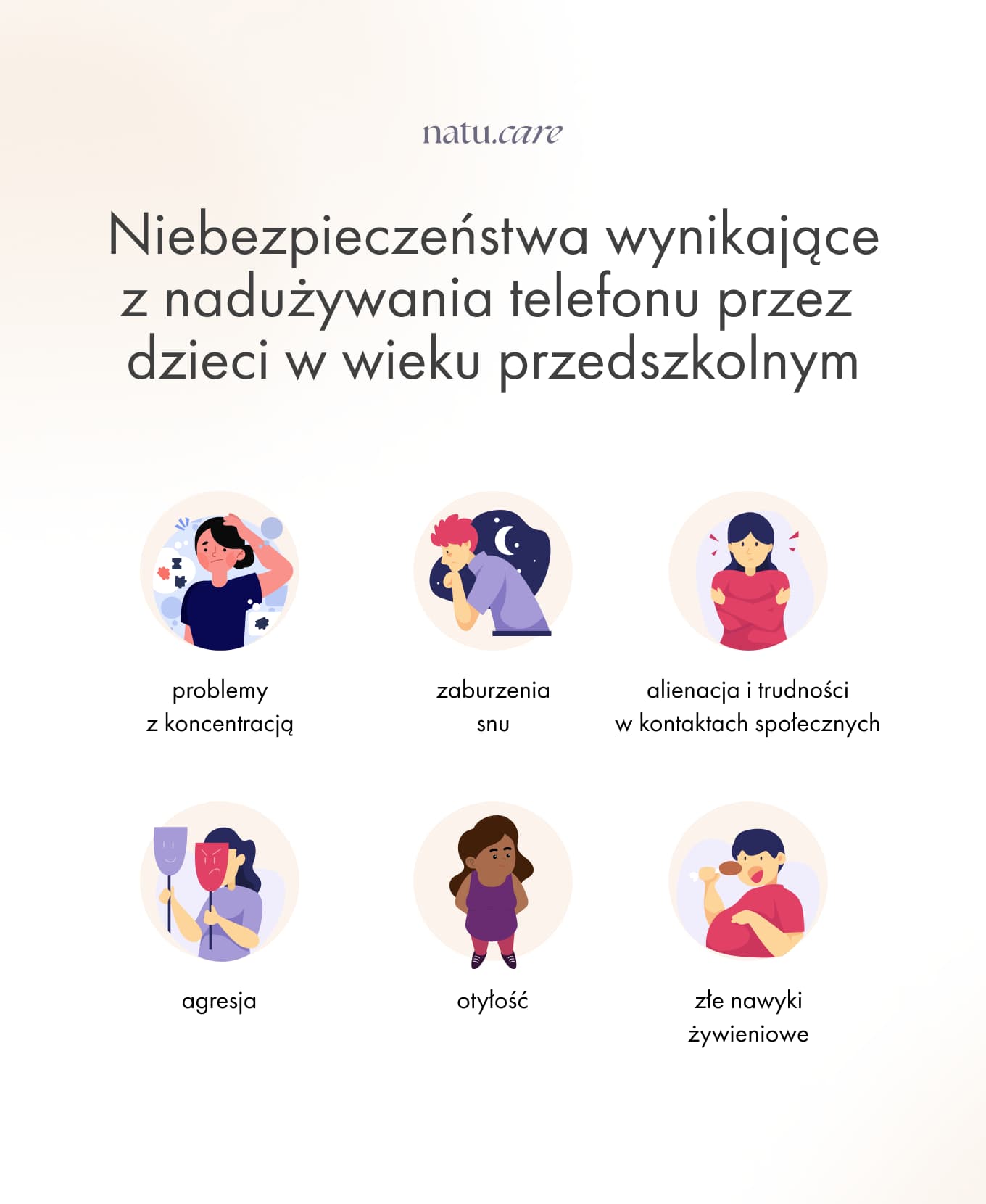
Development by... phone?
.It's possible! Instead of the 324th session of your favourite episode of Dog Patrol, offer your child simple but developing games and apps. With these, your preschooler can learn about animals, solve puzzles or learn languages.
They are a great way to get to know your child.
Valuable games can be found in the Safe Mobile Apps Catalogue on the Networkers website. We found a few more:
- Kahoot! Numbers by DragonBox - helps children understand numbers. Can be a great introduction to learning maths. .
- Monkey Stories: Books & Reading - compliant with the standards of the Common European Framework of Reference for Languages, it is used to learn English through play.
- Tinybop, The Human Body - enables you to see how the human body works. Anatomy given in an interesting, simple and accessible format for children. .
Summary
.- Children up to the age of two should not spend time in front of a TV, computer, tablet or smartphone.
- The use of mobile phones is a major concern.
- The overuse of mobile devices by children a few years old can interfere with their normal development, including brain development. .
- The maximum combined use of a phone and tablet by preschoolers is about one hour per day. At any one time, a child should not stare at a screen for more than 15 minutes. .
- Mobile device addiction can affect even the youngest children and has negative developmental, behavioural and health consequences.
- In order for your child to use smartphones and tablets safely, control the time they spend with these devices and the content they share.
- Secure mobile devices with a password and enable parental mode. .
- On the virtual app market, there are developing proposals aimed at the youngest. You can reach for them and make the time spent in front of the small screen more valuable. .
FAQ
.Can a 5 year old play on his/her phone
.Yes, one form of entertainment for a five-year-old child can be games installed on a smartphone. It is best to choose ones that will introduce the preschooler to the basics of mathematics or serve as an introduction to learning a foreign language. However, it is important to ensure that the child does not spend more than an hour a day playing, and 15 minutes at a time.
How does the phone affect a child's brain?
The telephone can potentially affect a child's brain in a variety of ways. Possible effects include an increase in aggressive behaviour, reduced academic performance and attention problems in children. It is important for parents to monitor and regulate their child's phone use to prevent these negative effects.
Why children are not allowed to use the phone?
.Children under the age of two should not use the phone as it can disrupt the development of neuronal connections in the brain. Excessive time spent in front of a screen, including phone use, also has a negative impact on older children. Studies have shown that preschoolers who spend too much time in front of a screen have problems with attention and focus.
How to recognise a child's gaming addiction
.Symptoms of a child's addiction to games may include: constantly thinking and talking about the game when not playing it, neglecting his or her own appearance, showing signs of irritability, anxiety or anger when forced to stop playing, and limiting other activities in favour of this form of entertainment.
How to identify a child's addiction to games?
How much time can a child spend in front of a screen?
.How much time a child can spend in front of a screen depends on their age. For 3-4 year old children, phone and tablet play time is best limited to 30 minutes a day. It is assumed that for pre-school children, the maximum time spent using mobile devices should not exceed one hour per day.
What causes excessive phone use?
.Excessive phone use can contribute to a loss of interest in other activities and socialising. It can also cause sleep problems, postural defects, eye problems and promote obesity. This results in a noticeable decrease in quality of life.
At what age can a child be given a phone?
A phone should not be given to children until at least the age of two. In fact, the later it is, the better. If you're wondering what age is appropriate to give your child their first own phone, it's best to consider whether they are mature enough to use it responsibly.
Many people link the purchase of a phone for a child to when they start to stay at home on their own or go to school and out in the yard on their own.
Resources
.See all
.Ali, A. H., Salman, M. D., Saleh, R., Fayadh, E. N., Al-Hameed, S. abd, Falah, H., Thamer, R., saad, M., & Ali, A. H. (2019). The effect of the electronic devices on children. Journal of Physics: Conference Series, 1178(1), 012002. https://doi.org/10.1088/1742-6596/1178/1/012002
Almuaigel, D., Alanazi, A., Almuaigel, M., Alshamrani, F., AlSheikh, M., Almuhana, N., Zeeshan, M., Alshurem, M., Alshammari, A., & Mansi, K. (2021). Impact of Technology Use on Behavior and Sleep Scores in Preschool Children in Saudi Arabia. Frontiers in Psychiatry, 12. https://doi.org/10.3389/fpsyt.2021.649095
Antar, R. (2019). Exploring the Use of Electronic Media in Young Children's Lives and its Effects on Brain Development. Journal of Early Childhood Education Research, 8(1), Article 1.
.aplesset. (2019, August 8). What Does Too Much Screen Time Do to Kids' Brains? NewYork-Presbyterian. https://healthmatters.nyp.org/what-does-too-much-screen-time-do-to-childrens-brains/
Bąk, A. (n.d.). Use of mobile devices by young children in Poland.
.Impact of Technology on Kids Today and Tomorrow. (n.d.). Western Governors University. Retrieved March 20, 2023, from https://www.wgu.edu/blog/impact-technology-kids-today-tomorrow1910.html
NASK. (n.d.). NASTOLATE RESEARCH REPORT 3.0 (2021). NASK. Retrieved 15 March 2023, from https://www.nask.pl/pl/raporty/raporty/4295,RAPORT-Z-BADAN-NASTOLATKI-30-2021.html
Reid Chassiakos, Y. (Linda), Radesky, J., Christakis, D., Moreno, M. A., Cross, C., COUNCIL ON COMMUNICATIONS AND MEDIA, Hill, D., Ameenuddin, N., Hutchinson, J., Levine, A., Boyd, R., Mendelson, R., & Swanson, W. S. (2016). Children and Adolescents and Digital Media. Pediatrics, 138(5), e20162593. https://doi.org/10.1542/peds.2016-2593
Ricci, R. C., de Paulo, A. S. C., de Freitas, A. K. P. B., Ribeiro, I. C., Pires, L. S. A., Facina, M. E. L., Cabral, M. B., Parduci, N. V., Spegiorin, R. C., Bogado, S. S. G., Chociay, S., Carachesti, T. N., & Larroque, M. M. (n.d.). Impacts of technology on children's health: A systematic review. Revista Paulista de Pediatria, 41, e2020504. https://doi.org/10.1590/1984-0462/2023/41/2020504
Rocha, B., & Nunes, C. (2020). Benefits and damages of the use of touchscreen devices for the development and behavior of children under 5 years old-A systematic review. Psicologia: Reflexão e Crítica, 33(1), 24. https://doi.org/10.1186/s41155-020-00163-8
Sagr, A. N. A., & Sagr, N. A. A. (2020). The effect of electronics on the growth and development of young children:A Narrative Review. Journal of Health Informatics in Developing Countries, 14(1), Article 1. https://www.jhidc.org/index.php/jhidc/article/view/250
The Negative Effects of Technology on Children | NU. (2021, May 13). National University. https://www.nu.edu/blog/negative-effects-of-technology-on-children-what-can-you-do/
Zain, Z. M., Jasmani, F. N. N., Haris, N. H., & Nurudin, S. M. (2022). Gadgets and Their Impact on Child Development. Proceedings, 82(1), Article 1. https://doi.org/10.3390/proceedings2022082006
Analysis of the functioning of the telecommunications services market in Poland and assessment of consumer preferences. 2022. Survey of children and parents https://cik.uke.gov.pl/gfx/cik/userfiles/_public/badania_dzieci_i_rodzicow_2022.pdf
Editorials
Meet the team



World Water Day aims to raise awareness of the lack of drinking water in many regions of the world.

How many Poles are single and why have they chosen to live alone?
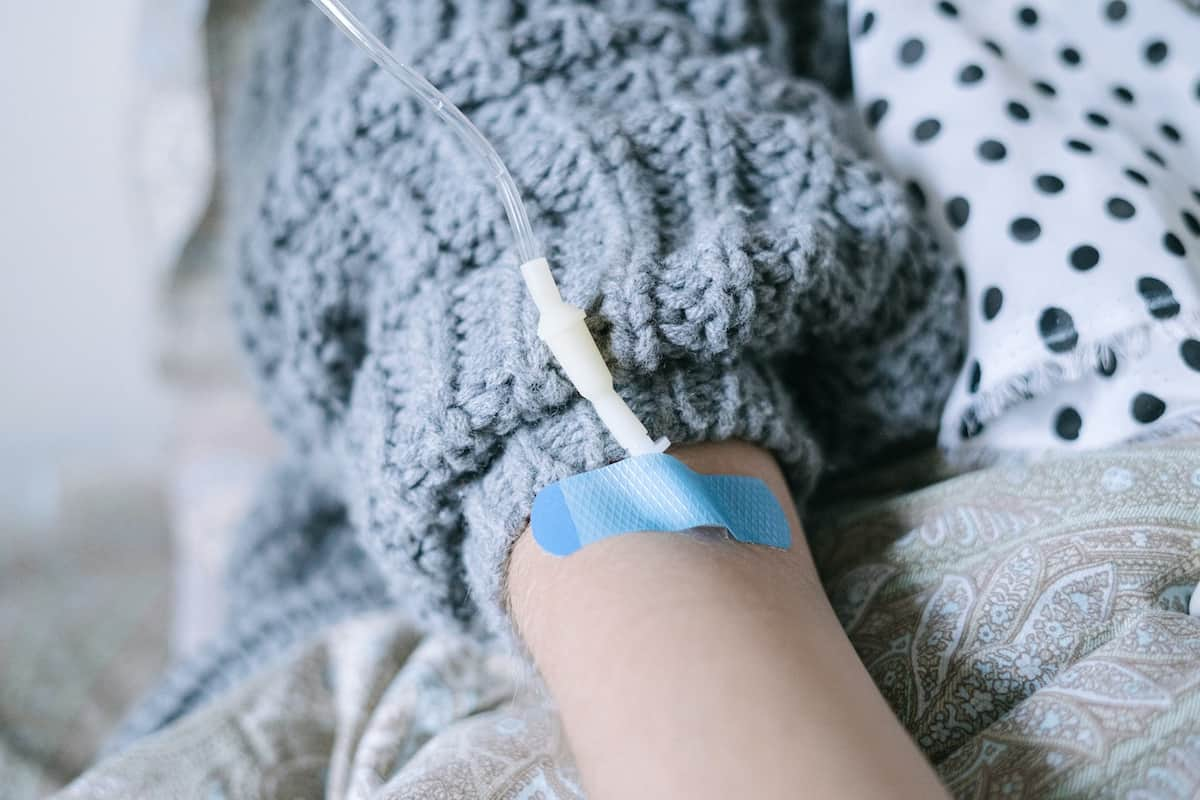
World Cancer Day encourages research and healthy lifestyles.



